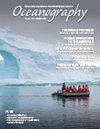海洋学中的合作学习
IF 2.8
4区 地球科学
Q1 OCEANOGRAPHY
引用次数: 0
摘要
STEM高等教育在招聘、留用和学习成果方面所面临的挑战,需要促进学生对自己能力的归属感和信念的学习环境(Møgelvang, 2023)。合作学习(CL)是一种与学习增加和更多“软”学生成果(如归属感增加、科学自信和通用技能)相关的群体学习(Møgelvang et al., 2023)。集体学习可以被定义为“一种更结构化,因此更集中的合作学习形式”(Millis和Cottell, 1997,第4页)。这种结构化的方法是基于研究的,被认为可以增加所有学生在小组工作中成功的可能性(Millis和Cottell, 1997)。本文章由计算机程序翻译,如有差异,请以英文原文为准。
Cooperative Learning in Oceanography
The challenges of recruitment, retention, and learning outcomes in STEM higher education call for learning environments that promote student belonging and belief in their own abilities (Møgelvang, 2023). Cooperative learning (CL) is a type of group learning associated with increased learning and more “soft” student outcomes such as increased sense of belonging, scientific confidence, and generic skills (Møgelvang et al., 2023). CL may be defined as “a more-structured, hence more-focused, form of collaborative learning” (Millis and Cottell, 1997, p. 4). This structured approach is research based and is considered to increase the probability that all students are successful at group work (Millis and Cottell, 1997).
求助全文
通过发布文献求助,成功后即可免费获取论文全文。
去求助
来源期刊

Oceanography
地学-海洋学
CiteScore
6.10
自引率
3.60%
发文量
39
审稿时长
6-12 weeks
期刊介绍:
First published in July 1988, Oceanography is the official magazine of The Oceanography Society. It contains peer-reviewed articles that chronicle all aspects of ocean science and its applications. In addition, Oceanography solicits and publishes news and information, meeting reports, hands-on laboratory exercises, career profiles, book reviews, and shorter, editor-reviewed articles that address public policy and education and how they are affected by science and technology. We encourage submission of short papers to the Breaking Waves section that describe novel approaches to multidisciplinary problems in ocean science.
 求助内容:
求助内容: 应助结果提醒方式:
应助结果提醒方式:


